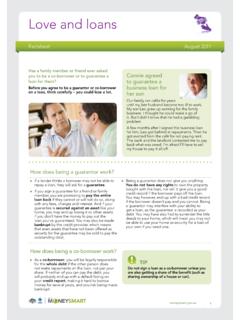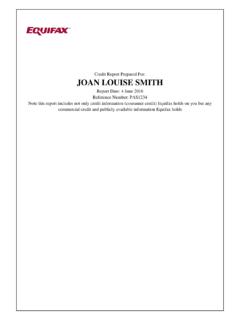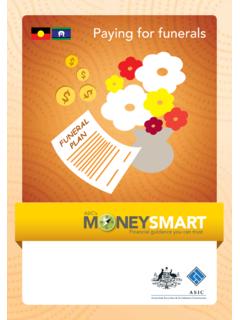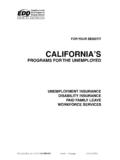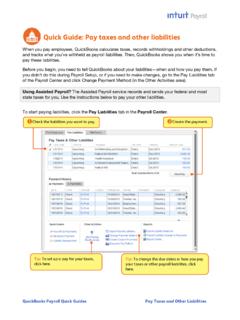Transcription of Can’t pay your debts? - MoneySmart
1 can t pay your debts ? 2017 1 Are your debts getting out of control? Maybe you re struggling to make ends meet because of unemployment, ill health, economic conditions or a relationship breakdown. Perhaps this is the first time you ve run into trouble with your finances. You might not know what to do if you can t pay your bills or meet your repayments, or where to go for help. Whatever your situation, it s important to act quickly. There is help s a juggling act for Steve and NickySteve and Nicky have two children, aged two and five. Recently Steve s carpentry business has been slow and the family s income has dropped. For the first time in their lives, Steve and Nicky find themselves with no available cash and have to juggle credit cards to pay their bills.
2 They ve reached the limit on three out of their four credit cards and are using the fourth card to make minimum monthly repayments on the other cards, repayments on their home loan and to pay bills. Steve is confident that business will pick up. In the meantime, they re contacting their credit providers to ask if they can reduce repayments on their credit cards for a short time. They plan to try and keep up with home loan repayments because their mortgage is their most important Avoid doing nothingTalk with your credit provider XIf you can t keep up with repayments on a credit card or loan (including a home loan), talk with your credit provider as soon as possible and let them know you are experiencing financial hardship (see steps 3 6 on pages 4 5 overleaf).
3 XIf you can t come to an agreement with your credit provider, ask them to review their decision if you think it s unfair. If you re still not happy, you can complain to the Australian Financial Complaints Authority (AFCA). See contact details on page 5). Apply for a hardship variation XIf you want to repay your debts but can t, and you haven t been able to negotiate an arrangement with your credit provider, you have a legal right to seek a hardship variation. This is a formal process where you ask your credit provider to vary the terms of your loan contract. XWithout any change being made to your current interest rate, you can ask your provider to extend your loan period, so that you make smaller repayments over a longer period of time, OR postpone your repayments for an agreed period, OR extend your loan period AND postpone your repayments for an agreed period.
4 XAfter you apply for a hardship variation, the credit provider must respond to your request in writing within 21 days. XIf your credit provider refuses your hardship application, it must give reasons. If you think the reasons provided are unfair, you can complain to an independent dispute resolution scheme, such as AFCA. can t pay your debts ? 2 TIP Avoid doing nothingPrioritise your debts XNot all debts are created equal! Prioritise secured debts like your home and car loan over ongoing payments on unsecured debts like credit cards, so you don t risk making yourself and others more exposed. XIf all of your unsecured debt (for example, debts incurred on credit cards and store cards) is turned into a secured debt over the family home, then you ve created some extra risk that your home could be on the line if things go wrong.
5 XIf your home is owned with someone else, they will also be 100% liable for any new loan that s secured over the whole property. Similarly, if you have to ask someone to be a guarantor for your new loan, you ll be exposing them to financial with multiple credit card debtsWhile it makes sense to pay off the debt with the highest interest rate first, if you re having trouble managing several debts for example, you re struggling to meet even minimum repayments on multiple credit cards here are two payment options you could consider:Option 1 XContinue making minimum payments on all cards, while aiming to clear the card with the smallest debt first. XThen work your way up to the next smallest debt .
6 This way you will reduce the risk of incurring multiple charges for late or missed payments, save on annual fees and be in a position to direct this money to clearing your other debts. XYou ll also be encouraged by having managed to clear a debt . This can be very motivating if you feel like your debts have become out of 2 XContinue making minimum payments on all cards. XPay off the credit card with the highest interest rate first and then keep working your way through your cards. This may have the advantage of saving money you re paying in interest. Whatever option you choose, stop using all but one of your credit cards (the one you want to end up with at the end).
7 Try to use it only for you clear each card, cut them up and close the account. This is important because, if you don t close the account, you may still have to pay fees on an account you don t the limit on the last remaining credit card to an amount that is manageable to repay within three months say, $2000. TIP Don t borrow to pay billsIf you are having trouble paying a water, phone, gas or electricity bill, contact your water, phone or energy company. Most companies have hardship officers who can help you work out a plan to pay the bill in instalments. If the provider won t help you, you can complain to one of the ombudsman schemes. XFor phone bills, contact the Telecommunications Industry Ombudsman at or phone 1800 062 058.
8 XFor energy and water bills, contact one of the ombudsman schemes in your state or territory:ACT 02 6207 1740 NSW 1800 246 545NT 1800 806 380 QLD 1800 662 837SA 1800 665 565 TAS 1800 001 170 VIC 1800 500 509WA 1800 754 004 can t pay your debts ? 3 Beware predatory brokers and credit providersAvoid brokers who make unrealistic promises about getting you out of debt or who use advertisements claiming they can help no matter how desperate your financial situation is. Anyone who asks you to sign blank documents, refuses to discuss repayments, rushes the transaction, or won t put all loan costs and the interest rate in writing before you sign up, is not to be trusted.
9 Equity is the proportion of your property that you own outright. If there is no mortgage outstanding on a property in your name, you own 100% of the equity. If you sold the property, all the sale proceeds would belong to you. For example, if you owe $100,000 on your mortgage and your home is worth $200,000, you own 50% of the equity. If you sold the property, half the sale proceeds ($100,000) would belong to you and half would go to repay your stripping is when someone takes advantage of borrowers in difficulty and exploits their desire to save their home by: Xcharging high fees, sometimes more than 20% of the equity in the home. Xarranging for a refinancing arrangement where it is extremely unlikely the borrower will be able to afford the new realistic about whether you can afford repayments under a new refinancing arrangement if you are already under financial stress.
10 You may need to consider making the tough decision to sell your home or downsize rather than tapping into your equity in an attempt to keep your home. If you do refinance but can t afford the new repayments, you may end up being forced to sell anyway and there will be less equity left to repay your debts and make a new start. What about refinancing?If you have a problem managing your repayments, it can sound like a good idea to roll all of your loans into one for example, using a personal loan or home loan. Consolidating or refinancing your loans can work for some people if it means they will be paying less in fees and interest. For others, it may be only a short-term fix, especially if you can t meet the repayments on your new loan.
